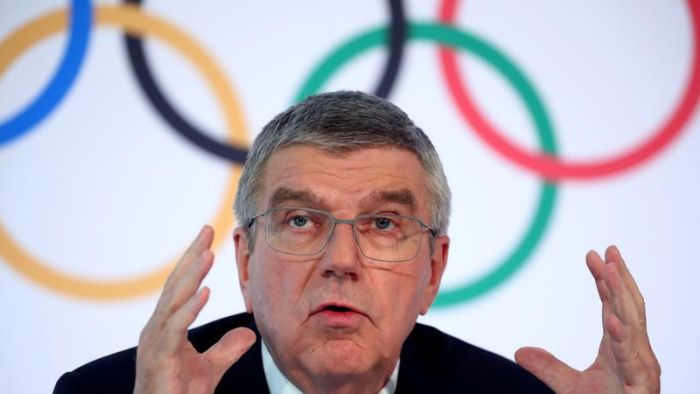Officials in Victoria cannot reach agreement to let around 1,000 players, officials and support staff into the state for a January Australian Open start.
But, a world away, the G20 Leaders’ Summit closed with a message of support for the Tokyo Olympic Games, where it’s expected tens of thousands of people will gather next July.
Key points:
- Thomas Bach wants the Olympics to send a worldwide message of solidarity
- In Japan, there are warnings hosting the Games in the middle of next year will be a gamble
- Officials in Melbourne are still working on details of how athletes will train ahead of the Australian Open
The final declaration of the G20 Summit named the host cities of the next two Olympics as symbols of the world’s resilience in fighting the pandemic.
“As a symbol of humanity’s resilience and global unity in overcoming COVID-19, we commend Japan’s determination to host the Olympic and Paralympic Games Tokyo 2020 next year,” the G20 Leaders joint statement read.
“We look forward to the Beijing Winter Olympics in 2022,” it added.
International Olympic Committee president Thomas Bach addressed the summit, invited by Saudi officials who are believed to be strengthening ties with the IOC ahead of a possible Olympic bid.
Bach said in his address that the Olympics “save lives”.
“During this coronavirus crisis, we all have seen how important sport is for physical and mental health,” he said.
“The World Health Organization has acknowledged this by signing a cooperation agreement with the IOC.
“Following this agreement, the UN, the WHO and the IOC launched a co-branded campaign called ‘Healthy Together’, rolling out projects internationally.”
Bach also said the IOC would play a role in a global pro-vaccination campaign.
“We have learned one important lesson from this crisis: we need more solidarity, more solidarity within societies and more solidarity among societies,” he said.
“These Olympic Games, with the participation of all 206 National Olympic Committees and the IOC Refugee Olympic Team, will send a strong message of solidarity, resilience and unity of humankind in all our diversity.”
A ‘light at the end of the tunnel’ or ‘a gamble’?

During last week’s visit to Tokyo to inspect facilities and review the current contingency plans, Bach described the Games as a “light at the end of the tunnel”.
But the Japan Times newspaper has described the determination to push ahead with the Games amid so much uncertainty around the pandemic and access to a vaccine as “a gamble”.
Kenneth McElwain, a professor at the University of Tokyo’s Institute of Social Sciences, told the paper that weighing the benefits of hosting the Games against the cost of cancelling them was a difficult prospect.
“Having the Olympics is certainly a feelgood story,” he said.
“If the Olympics don’t happen, at a global level I suspect that there’s going to be a lot of shrugging … in Japan it will be much darker and would trigger a relitigating of every decision the government has made.”




Meanwhile negotiations around the Australian Open are continuing in Victoria, with players adamant they need to be able to train during their quarantine ahead of the tournament.
The State Government’s decision to prevent a December arrival would see players quarantine for the first two weeks of January, with play beginning at the Open four days later.
Options being discussed include retaining the current dates but allowing players access to training facilities during the quarantine period, or delaying the Open by a couple of weeks or even a couple of months.
Neither Australian Open officials nor Tokyo Olympic officials have suggested cancellation as an option.







